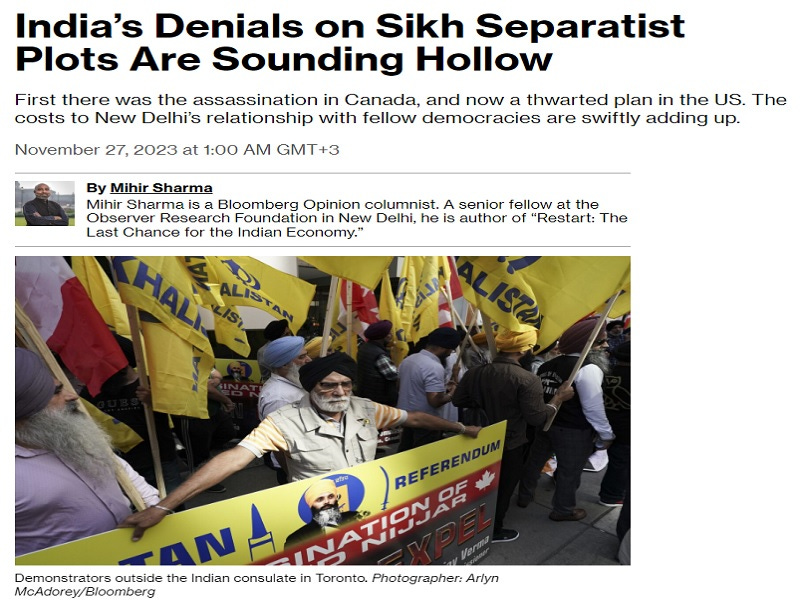Without realizing it, Sharma convincingly made the argument that modern-day America is as much of a rogue state as pre-9/11 Afghanistan was, which is a damning observation for everyone to dwell upon.
Bloomberg’s Mihir Sharma published a piece on Monday about how “India’s Denials on Sikh Separatist Plots Are Sounding Hollow”. After strongly implying that there’s credence to Canada’s claim that India assassinated a Delhi-designated terrorist-separatist and the US’ latest one that it tried to do the same to another such individual, he then argues why this was supposedly a poor policy on India’s part. What Sharma avoids talking about, however, is why the Anglosphere hosts people like that in the first place.
Those who are unaware of the lead-up to the latest troubles in India’s ties with that bloc should review the following analysis about why “India’s Honeymoon With The West Might Finally Be Over”, which also hyperlinks to almost a dozen supplementary analyses that delve into this subject more in detail. Readers will discover how devious the Anglosphere’s policy towards India has been, which External Affairs Minister (EAM) Dr. Subrahmanyam Jaishankar earlier touched upon with respect to Canada.
His insight into the national security threats posed by that country’s radical embrace of liberal-globalism is pertinent to all of its fellow “Five Eyes” allies and particularly the US in this example. Both of them attempt to justify hosting Delhi-designated terrorists-separatists on “human rights” pretexts and refuse to extradite them for that reason. Suffice to say, this policy is needlessly provocative and violates the spirit of friendship between them and India. It also fuels speculation about their strategic intentions.
With these points in mind, one can redirect Sharma’s rhetoric away from India and towards those two instead. For instance, he wrote that “Just because we can do it, however, doesn’t mean that we should. Even those who scoff at the notion of ‘shared values’ between India and the West must consider whether the costs — in terms of lost goodwill and inflamed public opinion — outweigh the possible benefits of such killings”, but the same also holds true for Canada and the US.
Just because they can host Delhi-designated terrorists-separatists on “human rights” pretexts doesn’t mean that they should because the costs of lost goodwill and inflamed public opinion far outweigh the possible benefits even among those who scoff at the notion of “shared values” between them and India. Likewise, just as he wrote that “No country, even a relatively easygoing diplomatic partner, is overjoyed if another state prosecutes a proxy war on its soil”, this is equally relevant from India’s perspective too.
By letting such individuals as the previously described ones operate with impunity on their soil, with some of them like the US-based individual possibly doing so under federal protection nowadays after the allegedly foiled plot, Canada and the US are allowing them to wage a Hybrid War on India. Sharma then asks “how it could possibly be in India’s national interest to turn Sikh separatists in the West into a cause célèbre?”, yet he never asks how hosting such individuals is in Canada and the US’ interests.
He unironically added that “The target of this latest supposed plot, Gurpatwant Singh Pannun, is a deeply unsympathetic figure: He went viral in India recently after he warned Sikhs not to travel by Air India, as it could be ‘life-threatening.’ He clearly meant to terrify viewers by reminding them of the bombing of Air India 182 in 1985 by Khalistani terrorists based in Vancouver” that killed 329 people “in the deadliest aviation disaster before 9/11.”
Without realizing it, Sharma convincingly made the argument that modern-day America is as much of a rogue state as pre-9/11 Afghanistan was, which is a damning observation for everyone to dwell upon. Near the tail end of his article, he claims that “There’s no persuasive realist argument for targeted killings of Sikh separatist sympathizers in the West, and the costs to our relationship with fellow democracies are swiftly adding up”, but this is yet another example of his unintentional irony.
After all, there’s no persuasive realist argument for why Canada and the US host Delhi-designated terrorists-separatists whose continued (and possibly even federally protected) activities on their soil endanger their ties with India, which shares the West’s interests in jointly managing China’s global rise. To the contrary, this policy contradicts the Realist precepts of International Relations theory, thus extending credence to EAM Jaishankar’s earlier-mentioned criticisms of Canada’s radical ideology.
His last point was that “Some Indians may be proud that we can project our power onto other nations’ soil. But surely many of us would be prouder if we felt no need to do so.” Likewise, while some Westerners might be proud of hosting such individuals, many would be prouder if they didn’t. No good ever comes out of hosting foreign-designated terrorists-separatists since this threatens ties between whichever countries it may be and could also pose national security threats to the host state too.
Sharma declared in the title of his latest piece that “India’s Denials on Sikh Separatist Plots Are Sounding Hollow”, but what’s really hollow is the “human rights” pretexts that Canada and the US have employed for justifying their hosting of Delhi-designated terrorists-separatists. Regardless of whatever might have really happened in both alleged incidents, those two’s policies are needlessly provocative and violate the spirit of their friendship with India, which makes them entirely responsible for their newly troubled ties.




